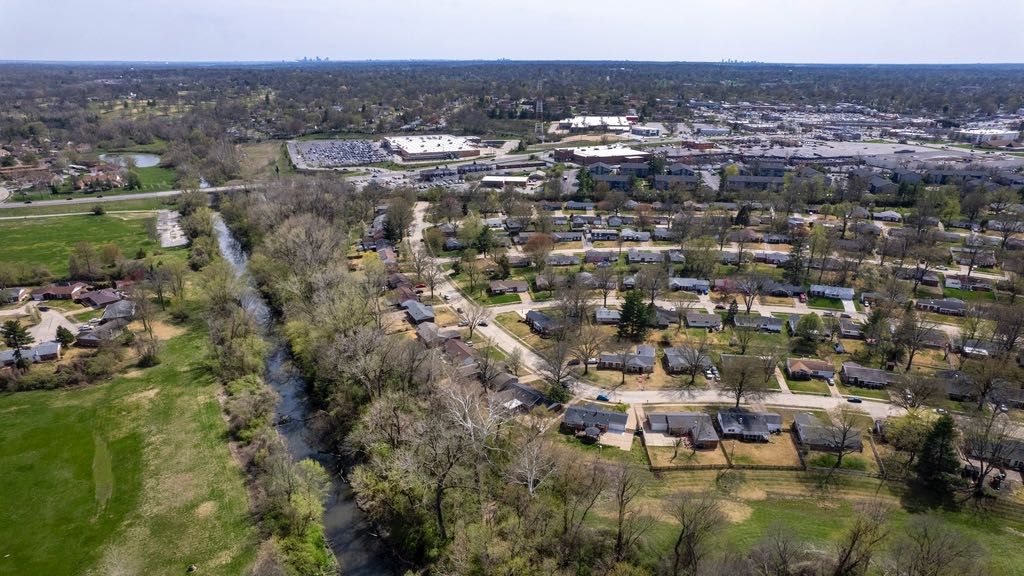Karen Nickel has been dealing with lupus and other illnesses for years, illnesses she blames on childhood exposure to a suburban St. Louis creek where Cold War-era nuclear waste was dumped decades ago. It's time, she said Friday, for the federal government to start making amends.
"People have died and are still dying," Nickel, co-founder of the activist group Just Moms STL, said.
Nickel and others impacted by nuclear waste exposure in the St. Louis region joined Democratic U.S. Rep. Cori Bush at a news conference at a park that sits near long-contaminated Coldwater Creek. They urged renewal of a law initially passed more than three decades ago that would provide an estimated $50 billion to compensate Americans exposed to radiation by the government.
Last month, the Senate approved legislation by Republican Sen. Josh Hawley of Missouri and Democratic Sen. Ben Ray Luján of New Mexico that would not only extend the 1990 Radiation Exposure Compensation Act, but expand its scope to include Missouri and other states adversely affected by the nation's nuclear weapons program.
But the compensation plan was excluded from a spending bill.
"The Senate did its job, but House leadership has failed to act," Bush, of St. Louis, said. "This injustice cannot stand."
The plan isn't dead. It could still pass as a stand-alone bill, or be attached to another piece of legislation. But time is of the essence, Bush said. The RECA program expires June 7.
Uranium processing in the St. Louis area played a pivotal role in developing the nuclear weapons that helped bring an end to World War II and provided a key defense during the Cold War. But eight decades later, the region is still dealing with contamination at several sites.
In July, an investigation published by The Associated Press, The Missouri Independent and MuckRock showed that the federal government and companies responsible for nuclear bomb production and atomic waste storage sites in the St. Louis area were aware of health risks, spills, improperly stored contaminants and other problems but often ignored them.
While it is difficult to prove definitively that the waste caused residents' illnesses, advocates argue that there is more than enough evidence that it has sickened people.
Since the RECA program began, more than 54,000 claims have been filed and about $2.6 billion has been awarded for approved claims in Nevada, Utah and Arizona.
In New Mexico, residents in the communities surrounding the area where the first atomic bomb was detonated in 1945 — the top-secret Manhattan Project — were not warned of the radiological dangers and didn't realize that an atomic blast was the source of the ash that was raining down upon them.
Advocates also have sought to bring awareness to the lingering effects of radiation exposure on the Navajo Nation, where millions of tons of uranium ore were extracted over decades to support U.S. nuclear activities.
President Joe Biden signed an executive order in 2022 extending RECA for two years, into June. Hawley's bill would extend the law for five years and expand coverage to include people in Missouri as well as Idaho, Montana, Colorado, Tennessee, Kentucky, Alaska and Guam.
The White House has indicated that Biden would sign the legislation.
"The President believes we have a solemn obligation to address toxic exposure, especially among those who have been placed in harm's way by the government's actions," the White House said in a statement earlier this year.
Others worry about the cost. The taxpayer advocacy group Committee for a Responsible Federal Budget said that the legislation should include budget offsets to pay for it.
Nuclear waste stored near St. Louis' Lambert Airport made its way into Coldwater Creek in the 1960s. Many people who grew up or live near the meandering creek believe the contamination is responsible for cancers and other illnesses, though experts say connecting radiation exposure to illness is complicated. Cancer concerns also have been raised by people in nearby St. Charles County, Missouri, where uranium was processed and a large quarry became contaminated, resulting in a Superfund cleanup.
In 2022, a St. Louis County grade school closed amid worries that contamination from Coldwater Creek got onto the playground and inside the building. The Army Corps of Engineers announced last month that it is testing a few homes near the creek after high radiation levels were found in their backyards.
Like Nickel, Democratic state Rep. Doug Clemens grew up along Coldwater Creek. He said every man in his childhood neighborhood eventually died of stomach or intestinal cancer.
"They knew they were poisoning us for 75 years," Clemens said of the government. "RECA is a step. We must do RECA now."








